Home / Symposium
Pioneers of Metagenomics - Environment and Health
The Minisymposium with invited speakers will be held from 13:00 - 16:30 on June 28, 2018 Location: Room ENA 103, Engineering Block A, 622 Collegiate Pl NW, Calgary, AB T2N 4V8
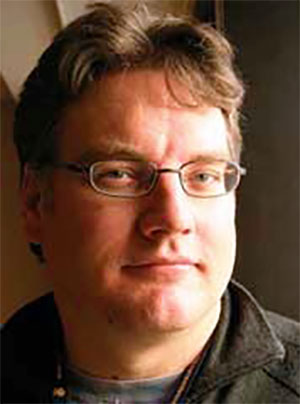
Dr. Peter Dunfield
Professor, Biological Sciences
University of Calgary, Alberta, Canada
Title: Single-cell genomics of uncultured bacterial phyla in Canada's most extreme environments
Abstract: 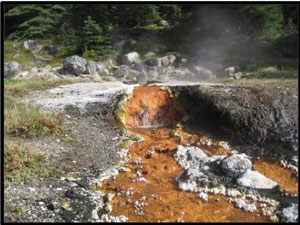 For the past 10 years, in collaboration with the Geological Survey of Canada, we have been cataloguing the biodiversity of the most physicochemically extreme habitats in Canada, including thermal springs in the mountains of BC (with temperatures up to 85oC), brine springs in Wood Buffalo National Park, and iron springs in Kootenay and Nahanni National Parks.The biodiversity of these habits is controlled in predictable ways by temperature and other stresses. However, a few unique sites are unusually rich in uncultured bacterial Phyla that have rarely or never been detected before. These sites represent unique natural enrichments of hard-to-study bacteria. In collaboration with the Joint Genome Institute, we are now using single-cell genomics and metagenomics to understand what these odd microorganisms do, and ideally learn how to culture them. In this talk I will introduce some of our favorite sites and the monsters that inhabit them.
For the past 10 years, in collaboration with the Geological Survey of Canada, we have been cataloguing the biodiversity of the most physicochemically extreme habitats in Canada, including thermal springs in the mountains of BC (with temperatures up to 85oC), brine springs in Wood Buffalo National Park, and iron springs in Kootenay and Nahanni National Parks.The biodiversity of these habits is controlled in predictable ways by temperature and other stresses. However, a few unique sites are unusually rich in uncultured bacterial Phyla that have rarely or never been detected before. These sites represent unique natural enrichments of hard-to-study bacteria. In collaboration with the Joint Genome Institute, we are now using single-cell genomics and metagenomics to understand what these odd microorganisms do, and ideally learn how to culture them. In this talk I will introduce some of our favorite sites and the monsters that inhabit them.
Biography: Dr. Peter Dunfield is a Professor of microbial ecology at the University of Calgary. He specializes in two areas: fundamental studies into the diversity of microbial life, and applied studies into bacterial methane oxidation. He has previously worked for the Max-Planck Society in Germany, where he researched how bacteria contribute to the environmental methane cycle, and for the Institute for Geological and Nuclear Sciences in New Zealand, where he studied bacteria in geothermal springs and geothermal power developments. His recent work is supported by NSERC, Emissions Reduction Alberta (ERA), Mitacs, Alberta Innovates, the Joint Genome Institute (US DoE), and The Canadian Oilsands Innovation Alliance (COSIA).
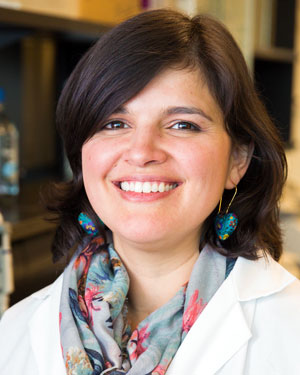
Dr. Marie-Claire Arrieta
Assistant Professor, Department of Paediatrics, Department of Physiology and Pharmacology, Cumming School of Medicine
University of Calgary, Alberta, Canada
Title: Gut microeukaryotes, a missing link in microbiome studies
Abstract: Human-associated microbial communities include prokaryotic and eukaryotic organisms across high-level clades of the tree of life. While advances in high-throughput sequencing technology allow for the study of diverse lineages, the vast majority of studies are limited to bacteria, and very little is known on how eukaryote microbes fit in the overall microbial ecology of the human gut. As recent studies consider eukaryotes in their surveys, it is becoming increasingly clear that eukaryotes play important ecological roles in the microbiome as well as in host health. Based on this, eukaryotes are likely fundamental species of the human gut and future microbiome studies should characterize the multitrophic interactions between microeukaryotes, other microorganisms, and the host.
Biography: Originally trained as a medical microbiologist in San José, Costa Rica, Claire moved to Canada to pursue graduate studies. She completed M.Sc and PhD programs at the University of Alberta in Edmonton, Alberta. Her doctoral work explored the role of intestinal permeability (leaky gut) in the pathogenesis of inflammatory bowel disease. Through her work, she became very interested in the concept of the gut as the engine of diseases that occur in organs far away from the gut. Following this, she completed a postdoctoral fellowship in the laboratory of Dr. Brett Finlay's, a prominent molecular microbiologist that has pioneered many studies in the field of the human microbiome. During her postdoctoral stay, Claire studied the relationship between the gut microbiome, the gut's immune system and asthma, a disease of the lungs. As an assistant professor, she continues to explore the relationship between the early-life microbiome and subsequent disease, and is also interested in studying ecological interactions between eukaryotes and prokaryotes in the gut microbiome. Besides her time spent in research, Claire is also very interested in science communication to the public. She has written one public book (Let Them Eat Dirt), and is currently working on a second book (a children's book), as well as on a documentary film project.
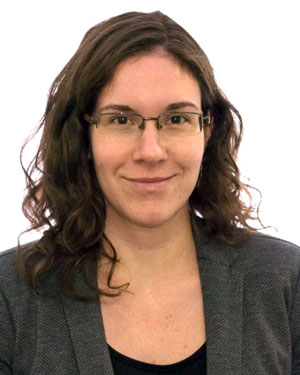
Dr. Laura Hug
Assistant Professor and Canada Research Chair in Environmental Microbiology
University of Waterloo, Ontario, Canada
Title: Bioremediation capacity in municipal waste sites identified through genome-resolved metagenomics
Abstract: 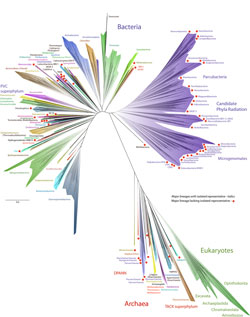 Total community approaches (omics) provide a blueprint of the microbial functions and community diversity within an environment. With genome-resolved metagenomics, this view can be refined, identifying an organism's specific contributions to pathways and processes as well as their interactions with other community members. This approach has led to a recent explosion of genome sequences for uncultured and uncharacterized microbial lineages, many with previously-unknown roles in biogeochemical cycles. My work explores the environmental importance of these novel organisms and the emerging view of the Tree of Life that stems from our new understanding of microbial diversity. Beyond microbial diversity, current work in the Hug lab is examining microbial function in municipal landfills: highly heterogeneous contaminated sites with potential for discovering new microbial bioremediation systems.
Total community approaches (omics) provide a blueprint of the microbial functions and community diversity within an environment. With genome-resolved metagenomics, this view can be refined, identifying an organism's specific contributions to pathways and processes as well as their interactions with other community members. This approach has led to a recent explosion of genome sequences for uncultured and uncharacterized microbial lineages, many with previously-unknown roles in biogeochemical cycles. My work explores the environmental importance of these novel organisms and the emerging view of the Tree of Life that stems from our new understanding of microbial diversity. Beyond microbial diversity, current work in the Hug lab is examining microbial function in municipal landfills: highly heterogeneous contaminated sites with potential for discovering new microbial bioremediation systems.
Biography: Dr. Laura Hug is an Assistant Professor and Canada Research Chair in Environmental Microbiology at the University of Waterloo. Her research examines the diversity and function of microbial communities in contaminated sites using a combination of ‘omics approaches and enrichment culturing. Current research in her group is characterizing the microbial communities colonizing municipal landfills, with foci on methane cycling, bioplastics degradation, and cellulolytic processes. Dr. Hug obtained her B.Sc. from the University of Guelph, her M.Sc. from Dalhousie University, her Ph.D. from the University of Toronto, and conducted a post-doctoral fellowship at the University of California Berkeley. Dr. Hug’s work has been featured in the New York Times, the Atlantic, Discover Magazine, and on Public Radio International’s “The World”.
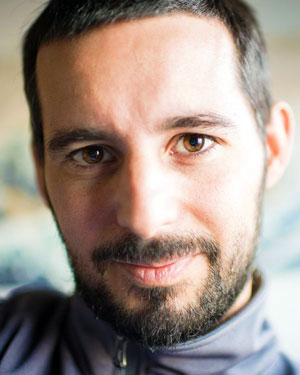
Dr. A. Murat Eren (Meren)
Assistant Professor, Department of Medicine, and a Fellow of the Marine Biological Laboratory
University of Chicago, Chicago, USA
Title: Microbial colonization dynamics in the human gut: from metagenome-assembled genomes to cultivars and back
Abstract: TBD
Biography: Dr. A. Murat Eren (Meren) is an Assistant Professor at the University of Chicago, Department of Medicine, and a Fellow of the Marine Biological Laboratory, studying microbial ecology and evolution in environments ranging from the human gut and oral cavity to sewer infrastructures, terrestrial habitats, and surface ocean. I primarily rely on genome-resolved metagenomics, and strive to translate 'omics findings back to the bench experiments to investigate mechanisms. Please find more info at http://merenlab.org.